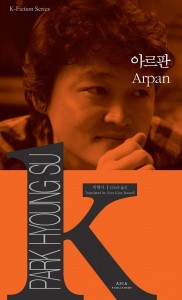 Two line drives directly out of the park to kick this ASIA Publisher series off (that would be two “for-sixes”, “goals”, or “cabers tossed a very long distance” to some of you strange foreign people)
Two line drives directly out of the park to kick this ASIA Publisher series off (that would be two “for-sixes”, “goals”, or “cabers tossed a very long distance” to some of you strange foreign people)
Arpan (available now on Amazon) by Park hyoung su is another shock to a habitual reader of Korean literature in translation as it treads overseas as well as into cultural relativism, and the position of plagiarism/copying in Korea. That’s a lot of territory covered, and it is covered with amazing alacrity in Park’s short story. Korean literature, as it always does, is evolving at shocking speed, and Arpan while seeming leisurely to read, pulls the same trick.
Arpan begins with an amazing feint, a successful Korean author remembering his time in Waka, the differences in culture there (as well as an amusing metaphor of stacking thing up to prove social importance that would have also fit well in a story by Park Min-gyu) and how the author finally did kind of fit in, and then find the last Wakan “writer.” Park hyoung su, like Kim In-suk (The Long Road); Kim Young-ha (Black Flower); Choe In-ho’s Deep Blue Night (perhaps the earliest and best of this genre); and Park Hyeong-seo’s still unpublished Krabi, knows how to tell a Korean story using (at least partially) a foreign setting. It’s a rare talent, but one that thankfully is becoming more common.
A “Wakan” author named Arpan visits Seoul for a book fair and gets the kind of treatment that third-world visitors know to expect here. After the talk the Wakan author sells 7 copies of his work, while the Korean author, supposedly merely a host, signs copies of his book until his wrist becomes numb.
This is not necessarily unexpected as one work is “Korean” and the other is not – this could be pretty much expected at a book fair in any city in any country; until the relationship between the two works is revealed, and suffice it to say the relationship is close.
After this, there is primarily a one-sided cleverly thought out monologue from one character to another essentially defending something morally incomprehensible to most readers. At which point the Wakan, the supposed victim of the immoral act, reacts in a most stunning way that I will leave to the reader to discover.
How stunning?
The conclusion of this work will make you think about the effects of globalization, where and how cultures can collide, coincide, and in a way collude so that one culture can continue to live on in the other. Even better, the author includes an essay on all these issues at the end of the book, so a reader can be certain that there was no idiot savant work going on here, that Park is consciously (and indirectly with respect to Korea in terms of the world as well as “Waka” in terms of Korea) thinking about culture and its evolution. A discussion which comes with the possibility of extinctions, mutations, and alterations that evolution necessitates.
As in the previous book of the series (and the books from the previous series), the translation (by the nearly always seamless Sora Kim-Russell) is grand: one or two small bump getting into the story, but then a beautiful flow of description and conversation that, as noted above, covers issues that concern the entire world (the loss of cultures), issues that are currently at play in Korea (what is plagiarism and what is respect for a previous author), and the relationship between creativity and co-optiviy.
As in the first story in the series, Dinner with Buffett, the story end on a strange note of harmony, with what has seemed liked a kind of dirty behaviour turned into a kind of homage and then a means of survival.
There are only two real characters in this work (a third character appears early and dies, but her wisdom is one of the strand of pearls that Park has created here – and on a strictly writerly note, uses brilliantly), one that barely speaks, yet a fully told story of globalization, internationalization, literature, culture, and literature and culture.
A beautiful story, containing apparently rocky moments as you read it, and well worth reading. The previous set of ASIA Publishers came out in collections, and if that were to happen to these books, they would be an even better bargain.
Buy them in Seoul if you come here – save a buck and a half.^^
95 books now… so… $150 bucks, practically speaking, off your ticket price.
/This announcement has been sponsored by the Korean Tourism Organization (KTO) who of course would never pay me a cent for it..
No, really. ㅠㅠ


